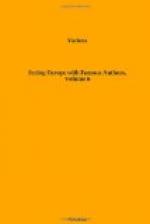I feel out of the world in this strange, fantastic, yet beautiful, old city. We have been rambling all morning through its winding streets, stopping sometimes at a church to see the dusty tombs and shrines or to hear the fine music which accompanies the morning mass. I have seen no city yet that so forcibly reminds one of the past and makes him forget everything but the associates connected with the scenes around him. The language adds to the illusion. Three-fourths of the people in the streets speak Bohemian and many of the signs are written in the same tongue.
The palace of the Bohemian kings still looks down on the city from the western heights, and their tombs stand in the cathedral of St. John. When one has climbed up the stone steps leading to the fortress, there is a glorious prospect before him. Prague with its spires and towers lies in the valleys below, through which curves the Moldau with its green islands, disappearing among the hills which enclose the city on every side. The fantastic Byzantine architecture of many of the churches and towers gives the city a peculiar Oriental appearance; it seems to have been transported from the hills of Syria....
Having found out first a few of the locations, we haunted our way with difficulty through its labyrinths, seeking out every place of note or interest. Reaching the bridge at last, we concluded to cross over and ascend to the Hradschin, the palace of the Bohemian kings. The bridge was commenced in 1357, and was one hundred and fifty years in building. That was the way the old Germans did their work, and they made a structure which will last a thousand years longer. Every pier is surmounted with groups of saints and martyrs, all so worn and timebeaten that there is little left of their beauty, if they ever had any. The most important of them—at least to Bohemians—is that of St. John Nepomuk, now considered as the patron-saint of the land. He was a priest many centuries ago [1340-1393] whom one of the kings threw from the bridge into the Moldau because he refused to reveal to him what the queen confest. The legend says the body swam for some time on the river with five stars around its head.
Ascending the broad flight of steps to the Hradschin, I paused a moment to look at the scene below. A slight blue haze hung over the clustering towers, and the city looked dim through it, like a city seen in a dream. It was well that it should so appear, for not less dim and misty are the memories that haunt its walls. There was no need of a magician’s wand to bid that light cloud shadow forth the forms of other times. They came uncalled for even by Fancy. Far, far back in the past I saw the warrior-princess who founded the kingly city—the renowned Libussa, whose prowess and talent inspired the women of Bohemia to rise at her death and storm the land that their sex might rule where it obeyed before. On the mountain opposite once stood the palace of the




